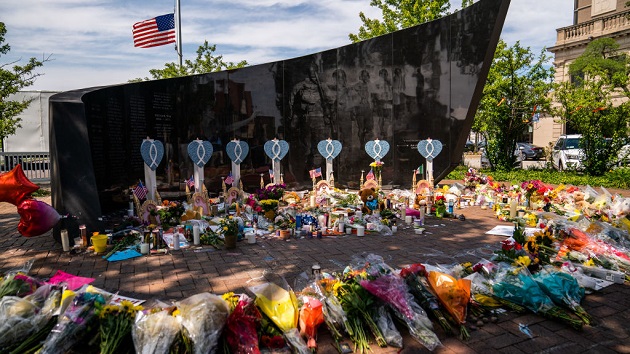
(HIGHLAND PARK, Ill.) — Rabbi Michael Sommer’s congregation has been “in a state of shock” ever since seven people were killed in a mass shooting during a July Fourth parade in Highland Park, Illinois.
Sommer, the leader of the Har Shalom congregation, told ABC News that both he and the majority of his congregants are from Highland Park. The congregation meets in nearby Northbrook.
Many of his congregants were at the suburb’s Fourth of July parade where a shooter opened fire from a rooftop.
“Everyone is in a state of grief. Everyone is looking how lucky they were to have their family safe… So everyone is trying to pull together, we hope; we all know each other here. It’s a very warm community,” Sommer said.
Highland Park is among a group of suburbs north of Chicago, including Skokie, Glencoe, and Deerfield, that have large Jewish communities and a constellation of synagogues, Kosher and Jewish restaurants, and organizations serving the Jewish community.
In the aftermath of the shooting, the Jewish community there is trying to grieve and find meaning through Jewish institutions and practice, even though leaders say that it is too soon to truly be healing.
Jewish news outlet The Forward reported that five of the seven victims were either Jewish or members of Jewish families.
One of them was Katherine Goldstein, who was a mother to two adult daughters, an avid bird watcher, and a lover of travel, according to a friend of hers who spoke with ABC News. She was 64.
Her synagogue’s rabbi, Ike Serotta, described her and her family as “just remarkable people.”
“All of them are the most incredible, gentle, kind, caring people that you could ever want to meet,” said Serotta, who leads the Makom Solel Lakeside congregation in Highland Park, told ABC News. “And Katie was just a delightful, funny, vibrant person who was really just one of the kindest people you could ever expect to meet in this world.”
While authorities have not said what motivated the suspect, investigative groups have pointed to the suspect’s social media posts as gravitating towards far-right ideas. The suspect also reportedly visited the Central Avenue Synagogue, a Chabad Jewish center in Highland Park, around Passover, leaving on his own after his presence raised concerns.
Michla Tzipporah Schanowitz, who runs the Central Avenue Synagogue with her husband Rabbi Yosef Schanowitz, described dealing with the events of July 4 as “kind of overload, trying to process the sorrow and the pain of what happened, and the shock. But also at the same time, knowing that we can do so much to bring so much light and goodness into the world.”
In the immediate aftermath of the shooting, Jewish leaders in the community scrambled to provide support to their congregants and to the broader community.
For Sommer, that meant helping out with social services at the local high school, as well as calling congregants to check in with them to see how they are doing. “I dread the phone calls I miss, or the phone number I don’t have, or who I should have called that I didn’t,” Sommer said.
And for Rabbi Yosef Schanowitz, that meant rushing to Highland Park’s hospital, where he regularly volunteers as a chaplain. He went from door to door, with “no time for small talk… I didn’t even ask people their names. They urged me to go from from door to door, and it was [for people of] all faiths,” Schanowitz said.
“I just poked my head into the door and just being introduced as I’m clergy and I just want to wish you all the best; our prayers are with you and God give you strength and bless you, and went on to the next room unless somebody needed to talk,” he added. “But in most cases, they were all traumatized, and there wasn’t a lot of back and forth discussion.”
The Jewish Sabbath, which runs from Friday night at sundown to Saturday night at sundown, exemplifies rest and joy in Jewish tradition.
“We’re supposed to celebrate Shabbat with with song and joy, and it was very subdued. And I added some outside readings to express our pain… and God’s presence in our lives to help us on this journey of healing and through our grief,” Sommer said.
Michla Tzippora Schanowitz said that ahead of the Shabbat, she worked with others to give out Shabbat candlestick kits, used for the ritual lighting of Shabbat candles at sundown on Friday. “And people were very receptive… it felt like it was able to channel their feeling of yes, bring light, spiritual light” after such a dark week.
Rabbi Yosef Schanowitz said that at the Seudah Shlishit, a third meal of the Sabbath that is usually held in synagogue between afternoon and evening services on Saturday, the congregation took some time to reflect.
“We also went around the table, and people had an opportunity to express themselves–where they had been [during the shooting], and the effect that it had on them, and who they knew that may have been hurt, and so on,” Rabbi Yosef Schanowitz said.
Serotta cautioned against speaking about the Jewish community being ready to heal so soon after the shooting.
“When something as evil and unnatural as this, I can’t say how long it will be until people are ready to start talking about the word healing,” he said.
Looking ahead, some of leaders emphasized discussions around enhancing synagogue security in light of the shooting, staying connected and finding strength with the broader community.
“We’ve always felt a responsibility one for another as a Jewish community, and also responsibility to other people who live in our community,” Michla Tzippora Schanowitz told ABC News. “We always rise to the occasion and support each other. And we’re doing that here and we’ll continue to do that.”
ABC News’ Will McDuffie and Aaron Katersky contributed to this report.
Copyright © 2022, ABC Audio. All rights reserved.
